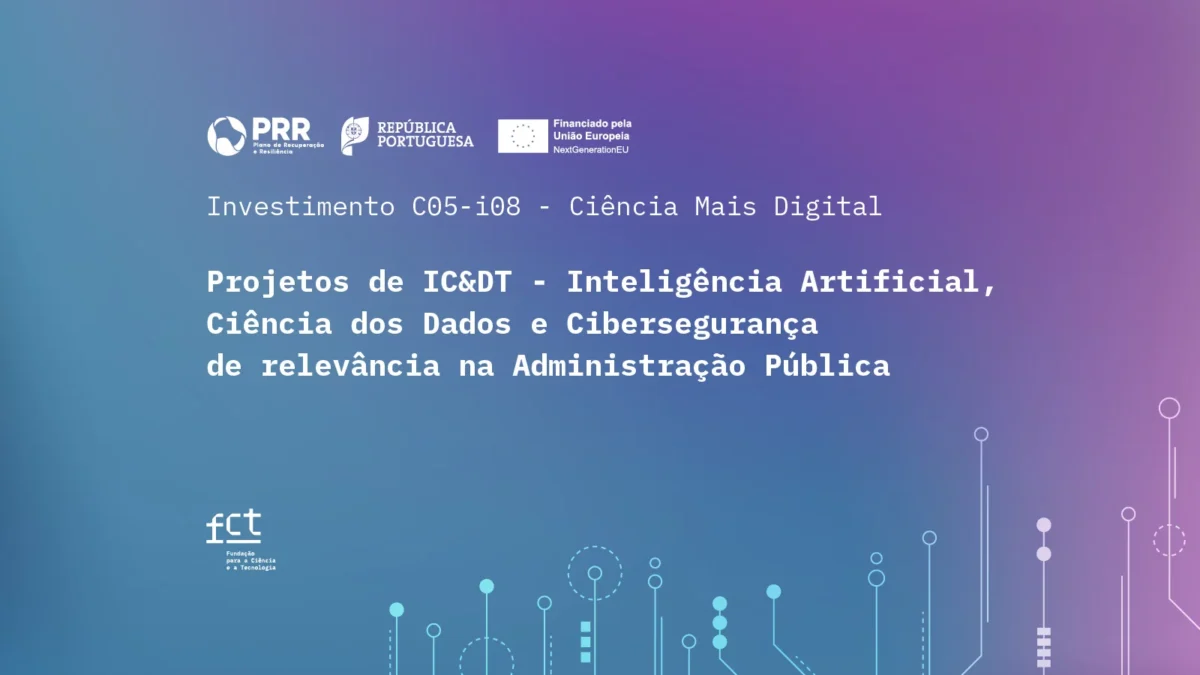
INESC-ID secures 14 new FCT-Funded Projects to Drive AI, Data Science, and Cybersecurity in Public Administration
After having two exploratory research projects (ERPs) approved in the Call for Exploratory Projects in All Scientific Domains 2023, INESC-ID recently had eight more projects approved by FCT, in the Call for the 2024 program in “Artificial Intelligence, Data Science and Cybersecurity of relevance in Public Administration”.
This call will be fully funded by the Recovery and Resilience Plan (PRR) and aims to support the launch of a programme of R&D projects aimed at the development and implementation of advanced Cybersecurity systems, Artificial Intelligence, and Data Science in Public Administration.
The projects will be focused on optimising resources and combating fraud and error, leading to continuous improvements in public services and mutual knowledge exchange between Public Administration and the National Science and Technology System (SNCT). This initiative is expected to accelerate the digital transformation of science and support services within the SNCT, while contributing to the increase of both national and international competitiveness of science and technology.
INESC-ID had the following projects approved in three different thematic areas:
Artificial Intelligence and Data Science
- “OptiGov: Leveraging AI for Process Efficiency in Public Administration”
Public Administration processes usually face challenges in compliance, particularly in aligning contractual specification documents with legal guidelines. To optimise and manage this complexity, the OptiGov project will harness the power of Data Science and Artificial Intelligence (AI), to introduce a method, enhanced with Large Language Model techniques, that will align specification documents and the meta-level guidelines dictating how the processes should be.
- “Sarcoma Clinical Data Integration with AI-Driven Automation for the National Oncology Registry”
The SARC-RON-AI project aims to develop an LLM-based (Large Language Model) system to efficiently process EHRs (Electronic Health Records), automating data submission for the southern regional oncology registry, Registo Oncológico Regional Sul (ROR-Sul). A prototype will be delivered, designed to operate within the real-world clinical context, thus improving Public Administration institutions.
- “EquiVet.AI: An AI Assistant for Veterinarians in Equine Practice”
PI: Luísa Coheur
EquiVet.AI proposes user-friendly non-invasive tools for the diagnosis of allergic diseases in horses, improving veterinary care and leveraging LLMs to generate reports from medical notes. The development of these tools will consider feedback from veterinarians, ensuring that the AI models are well-aligned with their needs, with the goal of facilitating their integration into daily workflows and promoting AI literacy within the community.
- “Artificial Intelligence in Tribunal”
PI: Ricardo Ribeiro
This project aims to enhance some of the capabilities of the IRIS initiative, a previous collaboration between INESC-ID and the Supreme Court of Justice (STJ), and to improve two of the three resulting apps, currently used by STJ. It will address challenges such as entity extraction, structure identification, summarisation, classification, and case analysis support. The ultimate goal is to increase efficiency, effectiveness and consider a broader context for the use of these application, including other national courts, the High Council of the Judiciary (CSM), and courts of Portuguese-speaking African countries (PALOP).
- “WebCAP: Web Data Collection via Automated Program Synthesis”
PI: José Santos
Web scrapers are programs used for the challenging process of parsing and retrieving information scattered across web pages, and although useful, their development and deployment are complex, error-prone and time-consuming. WebCAP will address this challenge by leveraging recent advancements in programming language and machine learning, to introduce a novel framework capable of automating the creation of web scrapers. It will be particularly focused on scrapers tailored to collect data relevant to the Portuguese public administration, improving the formulation of public policies across various sectors.
Cybersecurity
- “WELL – Wallet for ELectronic heaLth records”
PI: David R. Matos
The main output of the project will be combining cloud storage and a blockchain to create the WELL platform, composed of a repository to store EHRs (Electronic Health Records), and a wallet, to manage the EHRs of the patients. While the application will be designed for patients, medical professionals, insurance companies, and researchers, EHRs can only be shared with the consent of the patient, empowering the users with immediate access to and control over their health data.
- “InfraGov: A Public Framework for Reliable and Secure IT Infrastructure”
PI: João Ferreira
InfraGov aims to develop an innovative solution for automated error and vulnerability detection and repair in software configuration and infrastructure code. The project involves collaboration with INESC-TEC, Agência para a Modernização Administrativa (AMA), Instituto de Gestão Financeira e Equipamentos da Justiça (IGFEJ), and Entidade de Serviços Partilhados da Administração Pública (ESPAP). As public administrative services transition to digital platforms, this outcome will significantly reduce the incidence of system failures and security breaches, improving the reliability and security of IT infrastructures.
Interaction design and design of digital and physical systems
- “Pediatric Palliative Care Support System”
PI: Helena Galhardas
The expected result of PiCaSSO is an integrated digital platform for the registration, characterisation, and monitoring of children and young people with Complex Chronic Diseases (CCDs) and palliative care needs in Portugal. This characterisation and monitoring will be essential to effectively stratify and organise the delivery of palliative care for these children and establish a care network supported with well-specified data.
Besides these, INESC-ID is also a collaborator in six other projects, all in the thematic area of Artificial Intelligence and Data Science.
More information about the Call (in Portuguese) here.
